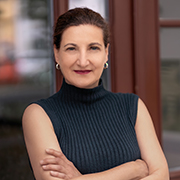Leonore is no longer a victim. In “Fidelio schweigt” the character who was merely a lover becomes an active subject and in so doing, emancipates herself from the well-known, all-too-familiar subject matter.
Beethoven’s opera “Fidelio” is unique on the theatre stage. What had to be established for other operas in the course of their performance history was true for Fidelio from the very beginning: the opera takes place in the here and now. The contradictions of the work, which Beethoven himself battled with, still apply today: the text, the narrative style, the historical theatrical form, the characters, the spoken dialogues – all these seem to resist a contemporary treatment of the work to the present day, so some stronger leverage has to be found.
“The victim is the person who does not take the initiative”, says the composer Charlotte Seither on the guiding principle of Leonore, the protagonist in her new stage work “Fidelio schweigt” (Fidelio is silent). “Together with Hermann Schneider, I have put aside precisely what for me restricts the subject matter historically, in order to make space for what interests me – removing the pressure for women to be victims.
In my work Leonore is no longer a victim. She is no longer just a lover, no longer the adjunct of a man – she becomes an active subject who, at the end, stands above traditional role models on a level with all the other powerful characters who surround her. Hope indeed remains hollow – as it does also with Beethoven – when it is not followed by action. That alone would justify such a work as a theme. As a woman, Leonore steps out of her context and is capable of power in that she acts. Yet in so doing she remains vulnerable. Empathy and power are not ruled out if a person is really capable of action. That is what I am interested in.”
The music theatre work “Fidelio schweigt” begins at this interface with Beethoven’s original, a “dialogue opera” as the composer herself describes her music-theatrical form. The many years’ study which Beethoven himself devoted to the subject and the form is simply re-thought here, making the content itself into a transitory object: the work begins with the second act, half of the work is shortened. “Where action takes place”, says the composer, “unusual interventions also have to be made and seemingly indispensable structures overridden.” The original (Beethoven) and the interpolations (Seither) thus follow each other in a new sequence, thereby opening a separate narrative thread which refers forwards and looks back at the same time: “Form is the present”, says Charlotte Seither: “Only when we do not know whether the end conceals a new beginning, or the beginning conceals a new end will we continue to do justice to the form of opera today.”
Together with the librettist and director Hermann Schneider, the composer places the emphasis on Leonore, whose disguise as a man in “Fidelio schweigt” has become obsolete. Leonore acts, she goes into the world and shapes it. The duplicity of Fidelio – the model of assuming a male pattern of behaviour – is thus finally overcome, it is silenced. And in the rest of the narrative, the core of the plot concentrates on the four main characters, whilst subsidiary roles have been omitted. “Where action takes place, then the familiar must also be let go, one also has to be able to name truth in clear language, even if that is sometimes very direct or can be hurtful” (Charlotte Seither).
“I decided”, says the composer, “to approach Beethoven’s method of composition with a sharp dissecting knife. In so doing I left his music in the original, but made clear vertical cuts into which I inserted my own music. It was important to me that both Beethoven’s original numbers as well as my music largely sounded ‘pure’, apart from the final conclusion. I rejected quotations, the anecdotal, and any kind of historicising artistic device.”
At the end of the dialogue opera there are various overwritings, the sound levels cross out each other at ever-shorter distances. “If you like, the form of the piece is an abstract replica on the discursive thinking in Beethoven’s late works; it therefore ends in the small, the contemporary, expected by no-one, in the here and now and perhaps nevertheless in a very personal form of utopia which continues to drive me on today” (Charlotte Seither).
Stephan Steinmetz/Charlotte Seither
(from [t]akte 1/2024 – translation: Elizabeth Robinson)



